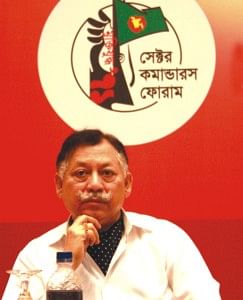|
Tribute
MIR SHAWKAT ALI warts and all
Syed Badrul Ahsan
 |
Lt Gen Mir Shawkat Ali – a warrior and secular being. Photo: zahedul i khan |
The first impression you had of Mir Shawkat Ali was the garrulity in him. He talked in rapid-fire manner; and he talked sense. In more ways than one, he was a raconteur and as is the case generally with raconteurs, he could spin yarns and retell tales he had grown up with. Perhaps they were also tales you had known of. But what Mir Shawkat Ali did was to bring a sense of urgency, indeed an infusion of energy into the narrative. He had an abundance of wit. And he laughed in the way men endowed with great humour laugh. There were all those times when you were led to wondering if he was laughing with you or at you. You paused to think, eventually drawing the conclusion that his association with Old Dhaka simply showed him up for the good man he was. He could not laugh at anyone, but he sometimes did laugh at himself. The self-deprecation was what endeared him to others, even if many of them did not exactly share his passion for the kind of politics he pursued.
And politics for Mir Shawkat Ali was a conundrum, or should have been. As a sector commander in the War of Liberation, he was imbued with all the ideals of secular nationalism the Bengali nation brought to bear in its twilight struggle against Pakistan. In a free Bangladesh, passing and rising through the various niches of military ranking, he kept alive the old secular yearnings in him, despite the all too clear turn to the right that national politics began to take in the aftermath of the murderous changes of August and November 1975. He stayed in the army, proved loyal to Ziaur Rahman. But his fortunes took a new turn with the arrival on the scene of Bangladesh's second military ruler. General Hussein Muhammad Ershad, perhaps the shrewdest of political operators in our times, sent Shawkat Ali off to different global capitals, to serve as ambassador or high commissioner for the country. But then, other generals have been sent off abroad as well, the better to have them keep out of any mischief they might cause the big general holding power at home. That was what happened to Shawkat Ali in Ershadian times. But a time came for him to come back home, link up with politics and begin a new phase in his career.
Mir Shawkat Ali came into the Bangladesh Nationalist Party, which was quite a departure for a man of his political sensibilities. The realities of his past did not quite fit in with those of his new present. A warrior, a secular being, he nevertheless saw and felt hardly anything wrong in being part of a political party which cloaked its essentially communal features in questionable nationalistic garb. He enjoyed being a minister in Khaleda Zia's first government. And once the BNP lost the elections of June 1996, he appeared to have lost interest in politics as well. In the end, he lost out altogether. Or did he? He refused to have any dealing with Khaleda Zia's second government because it shared political power with the Jamaat-e-Islami. His protest, in black and white, was ignored by his leader. It hardly mattered, for by then Shawkat Ali was beginning to rediscover his original moorings. The matter of a trial of war criminals saw the energy surge in him, to a point where he spontaneously became part of the Sector Commanders' Forum. Suddenly, it was the old Mir Shawkat Ali once more. It was a new battle against the ghosts of Pakistan that he became engaged in, beyond partisan politics. The hunter once lost to the vagaries of time and fortune had returned to the tribal wigwam. And we tried to forget those bizarre moments when Shawkat Ali, in manner reminiscent of Ayub Khan, attempted presenting an image, moustache and tilted Jinnah or Jinnah-like cap and all, that was a throwback to Pakistan's first military ruler. And we were willing to forgive Shawkat Ali that Sancho Panza moment when he told us that Ziaur Rahman, in the enveloping darkness when the country appeared to collapse in disarray, stood on a drum and declared Bangladesh's independence. We laughed. He knew why we were laughing.
In Mir Shawkat Ali was personified the politics of confusion that steadily devoured common sense in Bangladesh after 1975. He was a patriot, a freedom fighter whose dislike of collaborators, of the occupation Pakistan army, was visceral. And yet he was not averse to going along with Ziaur Rahman as the latter went about rehabilitating the very quislings who had helped to murder tens of thousands of Bengalis in 1971. He identified with the pseudo political principle that was 'Bangladeshi nationalism'. Even so, he never failed to pay homage to the man who had spurred the Bengali nation to freedom. For him, unlike so many others in his political tent, Sheikh Mujibur Rahman was, always and insistently, Bangabandhu.
In the end, Lt. Gen. Mir Shawkat Ali was a product of history. Again, in the end, he was part of the reason why history has so often been fugitive from this land of history makers.
Copyright
(R) thedailystar.net 2010 |
| |
